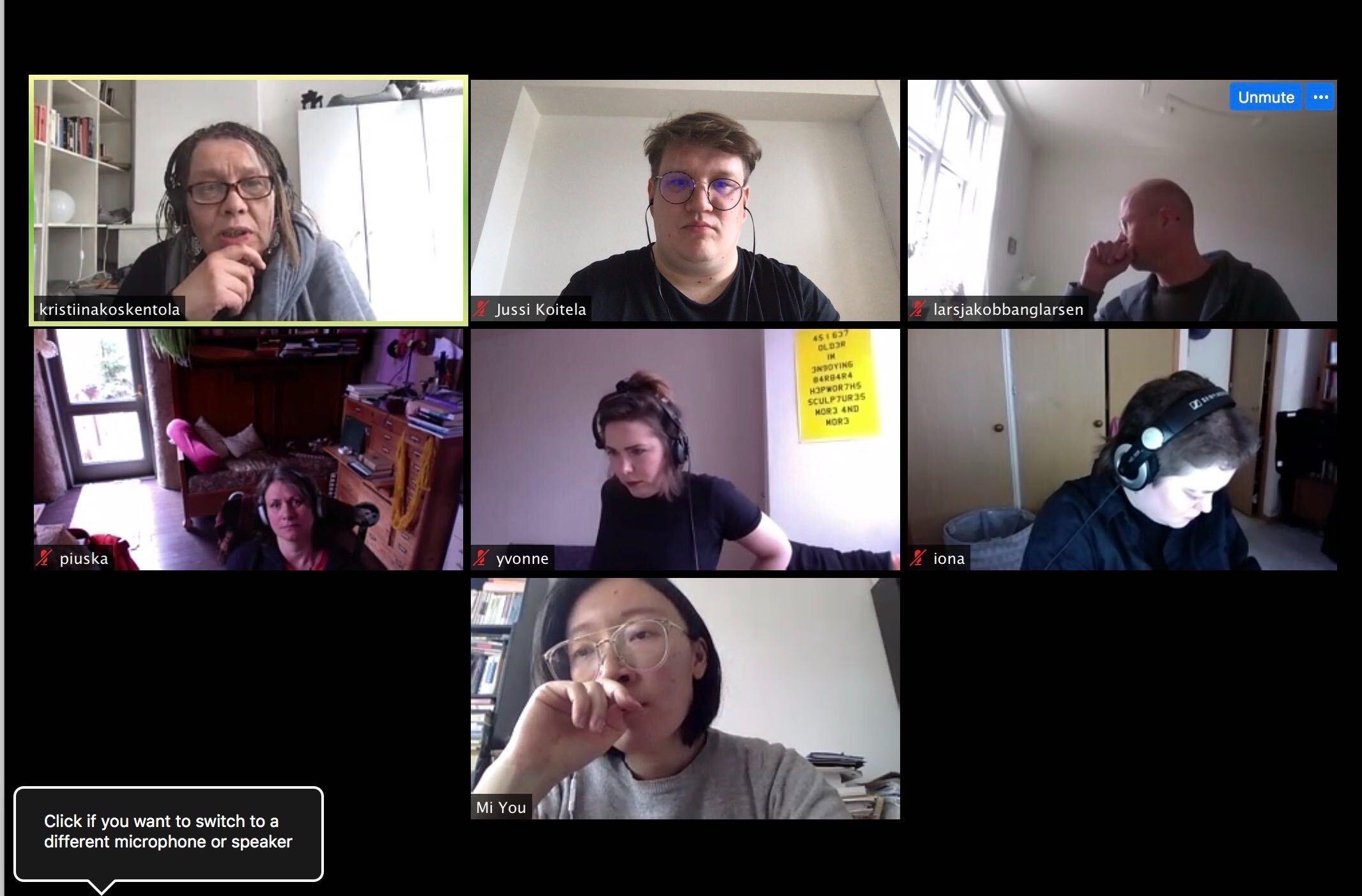Towards Ecologies of Access
April 2020
Towards Ecologies of Access was a discursive event in April 2020 forming part of Frame Contemporary Art Finland’s Rehearsing Hospitalities public programme. The event took the form of online conversations between artists Kristiina Koskentola and Pia Lindman and curators Lars Bang Larsen and Mi You.
Rehearsing Hospitalities 2019 responded to sociologist Boaventura de Sousa Santo’s concept of “ecologies of knowledges”, asking how contemporary art might become more hospitable towards diverse and interconnected knowledges. Continuing with “ecologies of knowledges” and applying it also to questions of access, the 2020 programme addressed art and institutional potential to facilitate plural and decentralised forms of knowing and accessibility.
Towards Ecologies of Access was a series of discussions on access to knowledge and experiences outside of Western epistemological binaries such as the body-soul, material-virtual and human-non-human divide. In their conversations the participants referenced different practices and cultural traditions such as shamanism, subsensorial ways of knowing and psychedelia—situated, embodied ways of knowing that are often marginalised or rendered invalid within Western and colonial knowledge systems.
The event looked into the ethics of artistic engagement in bringing these ways of knowing to the foreground and creating access to different situated knowledges. It questioned who can obtain ‘access’ to certain practices and how cultural power structures shape the ownership and production of these knowledges.
Towards Ecologies of Access was moderated by Frame’s Head of Programme Jussi Koitela and Associate Programme Curator Yvonne Billimore. Transcription was written by artist Iona Roisin.
During the session, the event was open to audiences to follow online through a live written transcription of the discussion with additional images, references and links to videos embedded.

14.00 Introduction by Jussi Koitela and Yvonne Billimore
14.15 Screening: Kristiina Koskentola, Flesh and Metal. Light and Oil, 2020, 27 min
Kristiina Koskentola’s film Flesh and Metal. Light and Oil. reflects on practices of Shamanism in Inner Mongolia and Historic Manchuria (China) alongside the effects of heavy industry and rare-earth mining in the region, global capitalism, and Koskentola’s own body. In the film, Shaman rituals intertwine with atmospheric electronic soundscapes and (industrial) landscapes. The film searches for a deeper relationship with natural and spiritual worlds through “alternative” knowledges. It explores the boundaries of human rationalism and knowledge production, environmental injustice and the slow violences of global capitalism. The film documents dialogues and ceremonies with the permission and collaboration of a number of Shamans, Healers and Musicians.
14.45 Kristiina Koskentola in dialogue with Mi You
After the screening, artist Kristiina Koskentola and curator Mi You discuss the film and reflect on practices of working with shamans and shamanism in Inner Mongolia, Manchuria and Russia, in particular (re-)access to worlds and knowledges, and the ethics and politics around it.
15.15 Short break and moment for inviting audience comments
15.25 Pia Lindman in dialogue with Lars Bang Larsen
Artist Pia Lindman and curator Lars Bang Larsen discuss concepts of “subsensorial” knowing and psychedelia in relation to Pia’s current body of work, Articulations of Forces at Play. This research intercepts crochet crafts as a way of perceiving, engaging with, and transmitting subsensorial knowledge. Their discussion highlights different cultural, social, and historical power structures of knowing differently. Who has ownership of these knowledges and how are they used? Why do we subscribe to certain epistemologies rather than others, and how do we embody knowing?
16.10 Short break and moment for inviting audience comments
16.20 Open discussion with speakers and audience comments and questions
Kristiina Koskentola is a visual artist. She earned her PhD from the University of the Arts/ Chelsea College in London. Her work spans across media including video, photography, materials, stories, objects, interactive performative projects, publications and lectures. With her recent projects she explores modes of knowledge production, polyvocal subjectivity and agency of multiple co-actors (human and not) often through ‘peripheral’ or forgotten ecologies. Transcultural and monistic perspectives, materiality and coexistence are central to her ethically and socio-politically driven practice.
Lars Bang Larsen is an art historian and an adjunct curator at Moderna Museet in Stockholm. He has (co-)curated exhibitions such as the 32nd São Paulo Biennial Incerteza Viva (2016), Mud Muses. A Rant About Technology (Moderna Museet, 2019-20) and Not Without My Ghosts (Drawing Room, London 2020). His books include The Model. A Model for a Qualitative Society 1968 (2010), Networks (2014), and Art and Psychedelia (forthcoming, 2020).
Pia Lindman is a doctoral candidate in the Nordic Cultures and Environmental Politics programme at Lapland University researching her concept of the subsensorial. A result of many years of investigation into the body and its place within the cultural space, Lindman’s work responds to a contemporary desire to mend the fission between science and art, healing and creativity–and moves beyond the human body proper to multiple realms of life.
Iona Roisin is a British artist and graduate of the Finnish Academy of Fine Arts. Based in Helsinki since 2015, she has participated in exhibitions and screenings in London, Helsinki, St. Petersburg, Moscow, Zagreb, Tallinn and Seoul. Primarily working across moving image and text, an entire adolescence spent on MSN prepared her for this specific moment.
Mi You is a lecturer at the Academy of Media Arts Cologne and Aalto University, Helsinki. Her long-term research and curatorial projects spin between the two extremes of the ancient and futuristic. She works with the Silk Road as a figuration for nomadic imageries and old and new networks/technologies. She has curated programmes at the Asian Culture Center in Gwangju, South Korea, Ulaanbaatar International Media Art Festival, Mongolia (2016), and with Binna Choi, she is co-steering a research/curatorial project Unmapping Eurasia. She is chair of committee on Media Arts and Technology for the transnational political NGO Common Action Forum.
